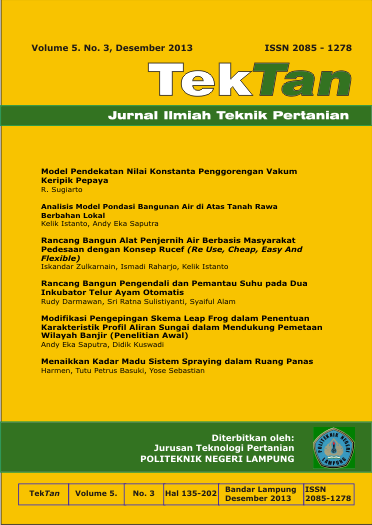Menaikkan Kadar Madu Sistem Spraying dalam Ruang Panas
DOI:
https://doi.org/10.25181/tektan.v5i3.847Abstrak
Honey is the natural sweet substance produced by honey bees from the nectar of flowers plants or other parts of plants. Honey is one of the important food sources for human nutrition because it contains 82.3% carbohydrate which is much higher than other livestock products. In addition to sugar, honey also contains mineral salts, proteins, and vitamins. Honey can be broken naturally (without human treatment) if the honey has been fermented. Yeast fermentation occurs high water content (23-30%). Safe from fermented honey water content is usually 16%-21%, or ideal levels of 16-20%. The decrease in moisture content (MC) is one of the most important steps in the processing of agricultural products. The decrease in MC can be done by drying. Principally, the drying can be done in various ways, including the provision of heat to the material drying by spraying liquid materials in high-temperature hot room is a way decreased the water content by increasing the surface area of the material that is in contact with the hot air. Drying honey with fogging (spraying) is an alternative way, in addition to other means such as drying by putting honey in the refrigerator in this case in a room air conditioner or refrigerator. The purpose of the study is the characterization test system temperature spraying in the heat chamber, the water content of honey characterization test on the spraying system in a hot room.The treatment given to the wild honey is honey squirts hot room temperature within a few levels, the levels observed were honey (%) and temperature of honey after drying. From the observations it can be seen that, the higher the lamp power given the higher heat generated. Tools have been able to raise the level of the honey, the higher the heating temperature higher levels of honey content  produced. Temperature honey received lower than a given heating temperature. Keywords: honey, spraying, hot roomUnduhan
Referensi
Hamad, Said. 1986. http://terapimadu.wordpress.com
Komarudin. 1997. Pengembangan Produk Madu. http://elibrary.mb.ipb.ac.id
Sarwono B, 2001, Lebah madu. Jakarta Agromedia pustaka
Siregar, Hotnida C. H. 2002. Pengertian Kadar Air Madu. http://terapimadu.wordpress.com
Sihombing,D. 1997. Ilmu Ternak Lebah Madu. Yogyakarta : Gadjah Mada Universitas Press.
Taib, G., Said dan S. Wiraatmadja. 1988. Operasi Pengeringan Pada Pengolahan Hasil Pertanian, PT Mediatama Sarana Perkasa, Jakarta.
USDA. 2013. http:// http://ndb.nal.usda.gov/ndb/foods/show/6170



